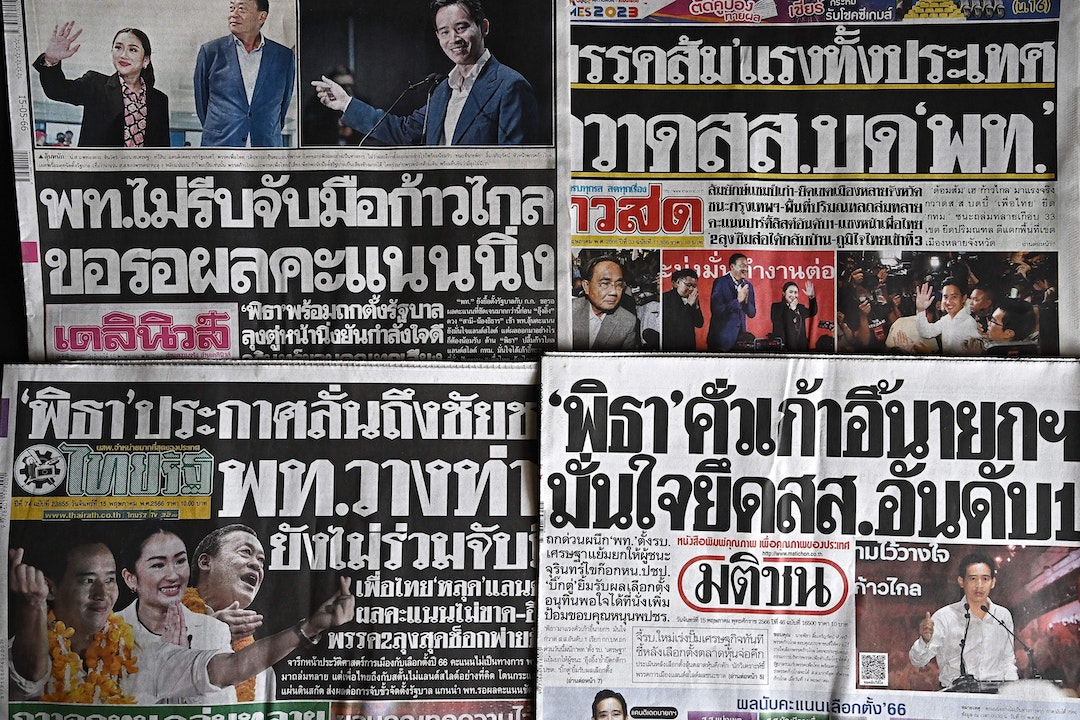
After Sunday’s remarkable “orange wave” victory for Thailand’s progressive Move Forward party, the big question is whether the Kingdom’s conservative forces will allow Move Forward to form government. Or does the party’s radical agenda – including reform of the lèse-majesté law – make this a non-starter?
While uncertainty abounds, the most likely scenario is that Move Forward is permitted to form a coalition government with Pheu Thai and other parties, at least for an initial period.
To recap, Move Forward – a fresh-faced progressive party contesting only its second election – won 152 seats at the weekend polls according to informal counting, making it the largest party in parliament. Thaksin Shinawatra’s more established opposition party Pheu Thai won 141 seats, while military-backed parties were trounced, winning less than 80 seats.
Move Forward leader Pita Limjaroenrat announced on Monday that he would convene a coalition comprising 309 MPs from “democratic” parties, including Pheu Thai, while Pheu Thai has indicated that it would not compete with this coalition-building effort.
Despite this, as much analysis has emphasized, Thailand’s conservative forces have both the motive and the means to thwart a Move Forward government. Many Move Forward policies, including far-reaching political reform to limit the role of the military in politics, are unacceptable to Thailand’s powerful conservative forces. Above all, the party’s plans to reform the lèse-majesté law, which Pita reiterated on Monday crosses a “red line” for the political establishment.
Conservative forces have all the necessary tools at their disposal to prevent Move Forward from taking government. Most notoriously, the 250-member unelected senate could countermand lower house MPs choice of prime minister – unless a hard-to-reach super majority of 376 out of 500 votes is secured. Early statements from individual senators to media are not promising, with several suggesting that they would not automatically endorse the winning party’s nominee.

The establishment also has less escalatory options in play. The country’s Constitutional Court, National Anti-Corruption Commission, and Electoral Commission lack political independence. They could ban Pita or his MPs from politics (Pita faces corruption charges for not declaring shares in a media company, the same charges that brought down his predecessor as party leader) or dissolve Move Forward as a party. They could also threaten to dissolve other parties who are willing to work with Move Forward.
Even so, there’s reason to think that Move Forward and Pheu Thai will be permitted to form a coalition, at least in the first instance. For one, heavy-handed moves against an election which has engaged Thai voters in record numbers – turnout was 75.2% – risk protests and discontent.
Mass youth-led protests in 2020 and 2021, which occurred in response to the dissolution of Move Forward’s precursor party, mobilized tens of thousands and threw into sharp relief sensitive issues that the establishment would prefer to avoid discussing, such as the role of the monarchy in politics.
And while the Thai military has been prepared to wear the risk of protest from Thailand’s rural northeast in the past, Move Forward’s commanding wins in Bangkok and other urban centers may make the military think twice. Just 15% of Bangkok voters endorsed current prime minister Prayut Chan-o-cha’s United Thai Nation party, whereas 42% chose Move Forward. These numbers make it clear that most Bangkokians – those at the core of Thai commerce, government, and intellectual life – have had enough of military rule. Early comments from the Thai Chamber of Commerce, for example, suggest that business groups would prefer to see a stable government that can advance much-needed reform rather than another period of political tumult.
The establishment may therefore judge that allowing Move Forward to take office is a smarter tactical move. After all, this election result is simply one event in Thailand’s long-running political conflict between progressive and establishment forces. In previous periods of instability, such as the 2014 coup, the establishment acted when it felt that all options had been exhausted. This time, decision-makers may calculate that they can allow events to run their course and use legal options to act later if red lines are crossed.
An uncertainty is whether Move Forward is open to compromising to survive. The party has already opted to push for reform, rather than repeal, of the lèse-majesté law. Within the broad Move Forward camp, more radical politicians will be urging Pita not to further bargain with the party’s principles. But further negotiations might be necessary to form government – whether to secure the support of the senate or more lower house MPs, for example those from the Bhum Jai Thai party, whose 70 seats make it a potential king-maker.
The Election Commission has until July 13 to declare official results, meaning parliament may not sit to vote for the next prime minister until July 28 – plenty of time for compromise, negotiations – and legal skulduggery – ahead.
This article originally appeared in the Lowy Interpreter. The News Lens has been authorized to republish this article.
READ NEXT: Do Americans Support Recognizing Taiwan?
TNL Editor: Bryan Chou (@thenewslensintl)
If you enjoyed this article and want to receive more story updates in your news feed, please be sure to follow our Facebook.







